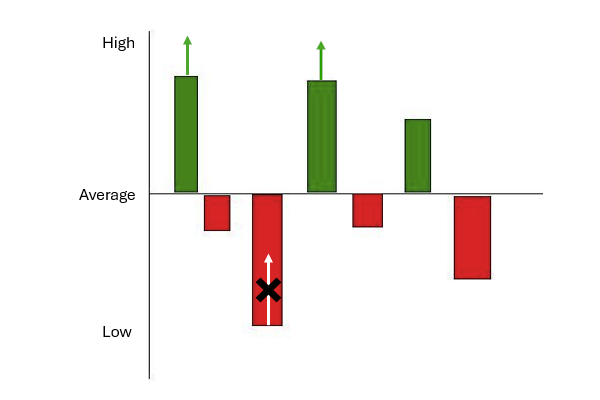
Develop your strengths, not your weaknesses
When Niall received his results from his latest psychometric test, he first noticed the qualities with the lowest scores on. As usual, he scored low on organisational skills and structural thinking. So frustrating! He thought these were tedious and uninteresting; they were definitely not his strengths. Yet he was tired of seeing such low scores, especially when he excelled at other characteristics like big picture thinking and personal drive. This time, he was determined to improve his low scores, so he created an improvement plan with the help of his manager. Over the next months, he invested a lot of time and hard work to become more structured and organised. Unfortunately, it was deflating, and his results were less than exciting.
Trying to fix your weaknesses is not a good use of your time
It’s so easy to fall into the trap of trying to improve on low-scored characteristics. But that is not how to become masterful at anything. If a profile shows that you are not particularly good at something, it’s likely that you also don’t enjoy it. Spending time trying to be good at something you don’t enjoy can be soul destroying.
As you work really hard to improve your ability with that quality, you are most likely going to end up with an average level of ability in it. Average. Mediocre. Not masterful. That, after all that time.
Leverage your strengths
If instead, we focused primarily on our strengths, honing them and building on them, we have a chance to go from good to great and even to masterful. These are likely the areas you enjoy, so the investment will be more interesting and fun. You will be more successful and more fulfilled.
And what if I have to improve those weaknesses for my job?
- There are some low scores you may need to tend to. For example, if you are unconscious about your impact and come across as a bully, yes, you definitely should focus some time and attention there.
- If you are self-employed and are horrible with admin, you will also need to suck it up and get on with the parts that you don’t enjoy – unless, of course, you can hire someone else to do those things.
- If your job requires you to improve many things that you are not good at, you might consider whether you have the right job for you.
- If it’s not urgent, but still necessary to improve, commit to changing but don’t invest all of your time. Be strategic about how much time that is – find a time when you feel resourceful and strong. Put limits on that and celebrate your wins.
- Focus on continuous improvement rather than perfection. It’s alright not to be perfect in every area; what’s important is to make steady progress and to learn from your experiences.
So, work on what you absolutely need to work on and otherwise, find ways to manage your weaknesses.
What does managing your weaknesses mean?
- Partner with someone or hire someone to do these chores, so you can focus on your strengths.
- Tell others where you are strong and where not. Ask for help.
- Use tools and technologies to compensate for your weaknesses. For instance, if organisation is a struggle, there are plenty of apps and systems designed to help you stay on top of things.
Mastery not mediocrity
I’ve delivered this information many times in leadership training, and it often surprises people. It makes total sense, but we haven’t thought so much about it before. Of course, trying to fix weaknesses can be draining while leveraging strengths can be inspiring and is the path to mastery rather than mediocrity.
You can learn about leveraging strengths and “strengths-based working” from Marcus Buckingham, specifically in his book, “Now, Discover Your Strengths”.
Coaches Going Corporate

Working with strengths is one way to work with internal aspects of a client’s world. In Coaches Going Corporate we focus our attention on strengths, values, beliefs and a wide range of internal aspects that help our clients make more powerful choices and changes.
more info